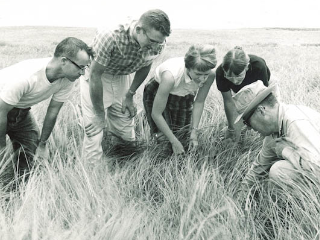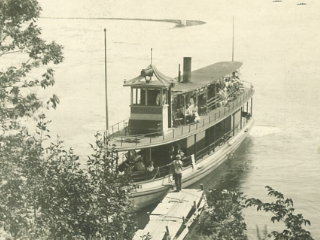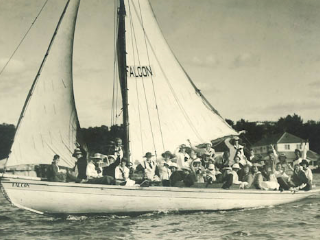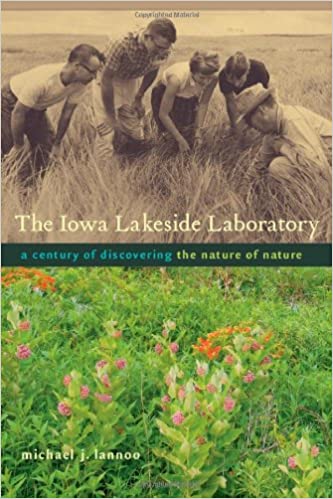History of Iowa Lakeside Laboratory
History
Lakeside Lab was founded in 1909 by Dr. Thomas Macbride and colleagues from the University of Iowa, for "the study of nature in nature." Ownership was held at first by a private stock company, the Lakeside Laboratory Association. In 1936 the Association deeded the station to the state of Iowa, "to be held in trust for the accommodation, promotion, support and maintenance of scientific studies and research."
A major construction program took place in the mid 1930s, when the Civilian Conservation Corps built five stone laboratories, four student cabins, a bathhouse, and other amenities. Additional buildings were added in the 1960s and 70s. The Waitt Building, opened in 1998, provided a modern water quality laboratory, additional classrooms, and staff offices.
In 2006 Lakeside was designated a Regents Resource Center, expanding both its audience and its mission. Today the Lab is a place where people of all ages and backgrounds can "study nature in nature."
Lakeside's early history was described in two fascinating articles in The Palimpsest 66:2 (March/April 1985). We thank the State Historical Society of Iowa for its permission to post that material here.
For an account of Lakeside's history from its founding to the present day, see The Iowa Lakeside Laboratory: A Century of Discovering the Nature of Nature by Michael J. Lannoo, published by the University of Iowa Press in 2012.
The Iowa Lakeside Laboratory: A Century of Discovering the Nature of Nature
Imagine a place dedicated to the long-term study of nature in nature, a permanent biological field station, a teaching and research laboratory that promotes complete immersion in the natural world. Lakeside Laboratory, founded on the shore of Lake Okoboji in northwestern Iowa in 1909, is just such a place. In this remarkable and insightful book, Michael Lannoo sets the story of Lakeside Lab within the larger story of the primacy of fieldwork, the emergence of conservation biology, and the ability of field stations to address such growing problems as pollution, disease, habitat loss, invasive species, and climate change.
At the intersection of major ecosystems with distinct plant and animal communities and surrounded by what, ironically, may be the most intensely cultivated landscape on earth, Lakeside has a long history of rubber-boot biologists saturated in the spirit that grounds the new discipline of conservation biology, and Lannoo brings this history to life with his descriptions of the people and ideas that shaped it. Lakeside’s continuing commitment to bringing the laboratory to the field rather than bringing the field to the lab has supported a focus on mammalogy, ornithology, herpetology, ichthyology, invertebrate biology, parasitology, limnology, and algology, subjects rarely taught now on university campuses but crucial to the planet’s health.
Today’s huge array of environmental problems can best be solved by people who have learned about nature within nature at a place with a long history of research and observation, people who thoroughly understand and appreciate nature’s cogs and wheels. Lakeside Lab and biological research stations like it have never been more relevant to science and to society at large than they are today. Michael Lannoo convinces us that while Lakeside’s past is commendable, its future, grounded in ecological principles, will help shape a more sustainable society.
Author: Michael J. Lannoo
Source: Directly from - University of Iowa Press - Click on the link below to learn more!
Friends of Lakeside Lab
The Friends of Lakeside Lab would not exist without Iowa Lakeside Laboratory, one of the oldest and first biological field stations established in the United States, and the only such facility in the North American prairie pothole region. The Friends organized in 1994 as a support organization for Lakeside, and formally incorporated in 1996.
Founded in 1909 and today operated by the Iowa Board of Regents, Lakeside was the dream of Dr. Thomas Macbride, one of Iowa's first conservationists and leading scientists. Macbride was also a gifted educator who understood the importance of hands-on, field based experiences to effective learning in the environmental sciences. Lakeside's mission to "teach about nature in nature", is a quote from Dr. Macbride.
With its location on the shores of Lake West Okoboji, its proximity to several state preserves and a diversity of freshwater and terrestrial ecosystems - including Iowa's deepest, longest and largest natural lakes - Lakeside is choice location for teaching, research and learning in the natural sciences.
After nearly a century of excellence in college and graduate-level teaching and research, however, Lakeside faced a crisis in the early 1990s when the Iowa Board of Regents recommended closing the Lab due to dropping enrollments and a dwindling state budget. In response, concerned citizens, Lakeside faculty and alumni banded together to discuss how to save Lakeside. Under the leadership of the University of Okoboji Foundation, a task force formed and met with the Regents and university presidents, and convinced the Regents to reconsider their recommendation to close the Lab.
The individuals that rallied to save the Lab from closure did not retire their efforts but founded the Friends of Lakeside Lab to ensure continued support and community input into Lab operations.



